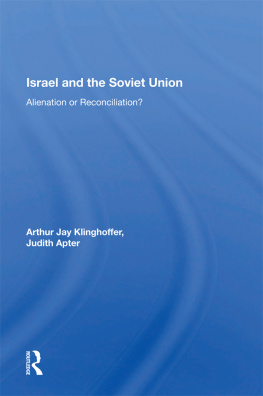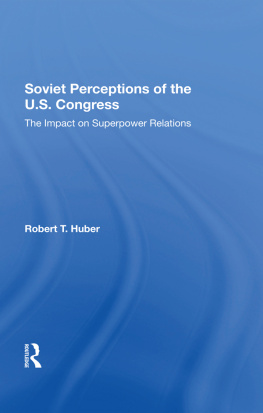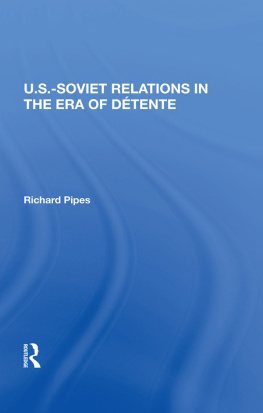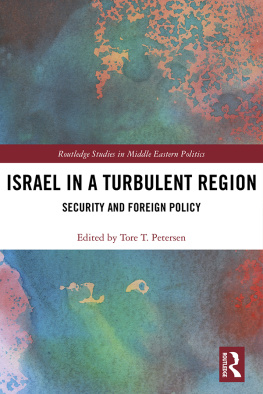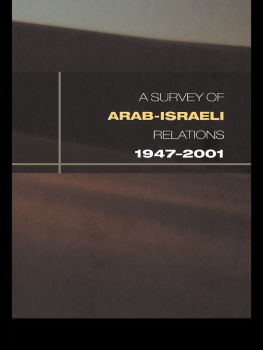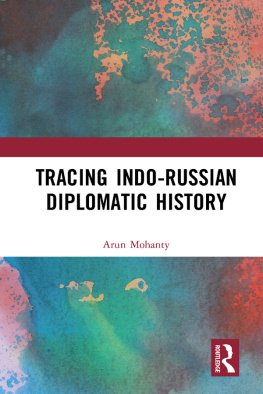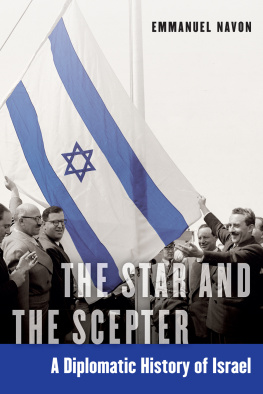Israel and the Soviet Union
About the Book and Authors
In June 1967, the Soviet Union severed official diplomatic relations with Israel to protest Israel's actions during the Six-Day War. Extensive Soviet-Israeli contacts continue despite strong Soviet support for the PLO and radical Arab states, Israel's close ties to the United States, and controversy over the issue of Soviet Jewry. This study is the first to reveal the intricacies of Soviet-Israeli secret diplomacy since 1967, with reference to a wealth of documentary material gathered from Israeli archives and insights gained in interviews with Israeli officials, journalists, and academicians.
Professor Klinghoffer explains why the Soviet Union opposes Arab destruction of Israel, why Israel has worked against Soviet-U.S. detente, why the United States did not favor an Arab-Israeli peace settlement during the early seventies, and why Soviet officials who are the most moderate toward Israel are also the strongest supporters of the PLO. In addition to providing a detailed examination of the interaction between Moscow and Jerusalem, this book thoroughly explores the issue of Soviet Jewry, the activities of the Israeli communists, the Soviet role in Middle East peace negotiations, and the question of whether Soviet-Israeli diplomatic relations can possibly be restored.
Arthur Jay Klinghoffer is a professor of political science and chairman of the department at Rutgers University, Camden, New Jersey. His publications include Soviet Perspectives on African Socialism , The Soviet Union and International Oil Politics , and The Angolan War: A Study in Soviet Policy in the Third World (Westview, 1980), and he coauthored The Global Politics of Gold . Judith Apter did graduate work in history at Hebrew University in Jerusalem and has spent more than twenty years in Israel. Fluent in Hebrew, she gathered and translated the Hebrew materials used in the research for this book and contributed significantly to the outlining of the chapters and the interpretive development of this study.
Israel and the Soviet Union
Alienation or Reconciliation?
Arthur Jay Klinghoffer, with Judith Apter

To Joella,
who patiently endured
the preoccupation of her parents
First published 1985 by Westview Press, Inc.
Published 2021 by Routledge
605 Third Avenue, New York, NY 10017
2 Park Square, Milton Park, Abingdon, Oxon OX14 4RN
Routledge is an imprint of the Taylor & Francis Group, an informa business
Copyright 1985 by Taylor & Francis
All rights reserved. No part of this book may be reprinted or reproduced or utilised in any form or by any electronic, mechanical, or other means, now known or hereafter invented, including photocopying and recording, or in any information storage or retrieval system, without permission in writing from the publishers.
Notice:
Product or corporate names may be trademarks or registered trademarks, and are used only for identification and explanation without intent to infringe.
Library of Congress Catalog Card Number: 85-50335
ISBN 13: 978-0-3670-0775-1 (hbk)
ISBN 13: 978-0-3671-5762-3 (pbk)
DOI: 10.4324/9780429037610
Contents
- 2 THE LOOSE KNOT
- 3 ALIENATION OF AFFECTIONS
- 4 OUT IN THE COLD
- 5 COMING TO BLOWS
- 6 UNREWARDED FLIRTATIONS
- 7 THE BREAKING POINT
- 8 SHUNTED ASIDE
- 9 SOME STEPS TOWARD RECONCILIATION
- 10 SEPARATE PATHS
- 11 COOL EMBRACE
- 12 DISTANT PARTNERS
- 13 ALIENATION OR RECONCILIATION?
- 2 THE LOOSE KNOT
- 3 ALIENATION OF AFFECTIONS
- 4 OUT IN THE COLD
- 5 COMING TO BLOWS
- 6 UNREWARDED FLIRTATIONS
- 7 THE BREAKING POINT
- 8 SHUNTED ASIDE
- 9 SOME STEPS TOWARD RECONCILIATION
- 10 SEPARATE PATHS
- 11 COOL EMBRACE
- 12 DISTANT PARTNERS
- 13 ALIENATION OR RECONCILIATION?
Guide
Acknowledgments
Research for this book was conducted in the Philadelphia area and in Israel. The Fulbright Program deserves special thanks for enabling me to spend a year at Hebrew University in Jerusalem, where I was able to delve into primary sources and interact with Israeli scholars. Dan Krauskopf, who administered the Fulbright Program in Israel through the United StatesIsrael Educational Foundation, was extremely helpful in arranging the details for a pleasant year in Jerusalem and he contributed greatly to an environment conducive to scholarly endeavor. In addition, the Rutgers Research Council provided significant funding to cover typing, duplicating, telephone and other expenses.
Many Israeli academics and diplomats made substantial contributions, including Simcha Dinitz, Mordechai Gazit, Yosef Govrin, Aryeh Yodfat, Galia Golan, Yaacov Ro'i, Israel Meh Ameeh, Shlomo Avineri, Pinhas Eliav, Eli Avrahami, Mikhail Agursky, Edith Frankel and Jonathan Frankel. Ron Finkel provided valuable information on Israeli tourism arrangements with East European states and graduate assistant Zach Levey was most adept at ferreting out obscure sources and in combing the minutes of Knesset sessions. In the United States, I have benefited from the sage comments of Robert Freedman and I am particularly grateful to former president Jimmy Carter for providing the time to discuss Middle East diplomacy during the period when he was in office.
Judith Apter must be congratulated for her diligence in researching Hebrew sources and for her extensive contributions to the analysis presented in this volume. Rosemarie Kenerley is responsible for the expert typing of the original manuscript and the final grid sheets. Please note that the sources used during my research used many different systems of transliterating Soviet, Israeli and Arab names. In the text, I used a consistent system of transliteration except in the rare instances when some other form has become the standard. In the notes, names are usually spelled as they appear in the sources cited.
The views expressed in this study are those of Judith Apter and myself and we bear the ultimate responsibility for any inaccuracies or omissions.
Arthur Jay Klinghoffer
Rutgers University
Through the Looking Glass
DOI: 10.4324/9780429037610-1
It was a sunny May day in 1979. Three military officers stepped forward and were awarded ribbons for meritorious service. An Israeli army representative joined in the ceremony. Who was being honored and where was this event taking place? Amazingly, the recipients were Soviet United Nations' observers who served in Syria! The location was Tiberias, Israel, on the shores of the Sea of Galilee. It would seem to be a rather unlikely scenario but, in fact, it was repeated in October 1983.
As one delves into the Soviet-Israeli relationship, things certainly do get curiouser and curiouser. In June 1971, a Soviet journalist and political courier paid a visit to the Western Wall. It is in contested East Jerusalem and is the most sacred Jewish site. In March 1978, there was a demonstration in Moscow against the Palestinians who carried out an attack along Israel's coastal highway! How about the incongruous effort in July 1970 by the mayor of Netanya, Israel. He tried to offer a blessing for Defense Minister Moshe Dayan in a Leningrad synagogue! In September 1976, the body of a Jewish Soviet colonel who died in Minsk a year earlier was sent to Israel for burial on the Mount of Olives. Also unusual is the fact that in 1978, an Israeli kibbutz built a textile plant that uses Soviet equipment. Or ponder the strange case of Igor Beliaev, a commentator on Middle Eastern affairs for Soviet newspapers. In April 1983, he was appointed Deputy Chairman of the Anti-Zionist Committee; in May, he was in Israel to celebrate the anniversary of the defeat of Nazi Germany.

